SPOKANE, Wash. — The Washington Department of Fish and Wildlife (WDFW) passed an emergency rule banning the feeding of deer, elk and moose in parts of Eastern Washington in order to manage the spread of chronic wasting disease (CWD).
It is now an infraction to "place, deposit, distribute or scatter feed including grain, hay, minerals, salt, fruit or other substances of food types to feed, lure, or attract deer, elk, or moose."
This applies to three game management units near the detection site: 124 Mount Spokane, 127 Mica Peak, and 130 Cheney.
The first case of CWD in Washington was confirmed in late July 2024. The infected sample came from a deer found dead in February in the Fairwood area of north Spokane County.
Since then, WDFW made emergency changes to baiting, transporting, testing and reporting of hunting in Eastern Washington.
In a press release, WDFW explained that feeding draws animals together, which raises the risk of them spreading CWD to each other.
They went on to say that other negative side effects of feeding wildlife include: habituating wild animals to humans, aggressive behavior towards people and pets when attempting to get the food, and bringing animals closer to roads where they can be hit by cars.
This rule does not apply to normal agricultural practices including the cultivation, production, and harvest of crops; or animal husbandry related to the care and feeding of domestic livestock and poultry.
You can read WDFW's full emergency rule change here.



